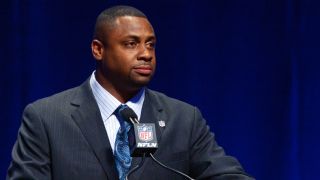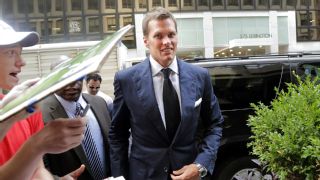|
Roger Goodell ultimately will decide whether Tom Brady's four-game suspension will be upheld or reduced. But Goodell didn't hand down the suspension. That was Troy Vincent. In just more than five years, Vincent has become one of the most powerful people in the National Football League, serving for the past 15 months beside Goodell as the NFL's executive vice president of football operations. A former first-round draft pick out of Wisconsin, Vincent played 15 seasons in the NFL and is a past president of the NFL Players Association. ESPN.com's Ashley Fox caught up with Vincent this week to talk Deflategate, domestic violence, punishing players and more. ESPN.com: You joined the league office in 2010 as the head of player engagement. Describe your role now as head of football operations. Vincent: First and foremost, my role in football operations is to protect the integrity and competitive fairness of the professional sport of football. There are several aspects to that, such as establishing a culture of clarity, consistency and credibility to players, coaches, clubs and fans in order to develop the future player, preserve and innovate the game and protect the NFL brand. Beyond that, our goal is to provide a world-class game-day experience for players, coaches and fans through innovation and proactively meeting the demands and challenges of the game and its players. Our charge is to change the conversation back to what is right about football by celebrating the value of our greater game to those who play it and to society in general. In essence, my role is to preserve the integrity of the game and position it for measurable and responsible future growth.  On the integrity-of-the-game issue, let's start with Brady. Why did you decide to suspend him for four games? As with all cases regarding on-field discipline, we conduct due diligence, make a determination and write up the recommendation on the discipline for the violation. There were a lot of factors considered inside of that recommendation. Like what? The commissioner has all of the information, and, as he has previously stated, he's going to evaluate it and make a decision. Why were you responsible for recommending the punishment for Brady? Let's be very clear: Football operations makes recommendations to the commissioner on football-related violations, dealing with those occurring on the field, anything that comes inside the stadium and game-day violations. Our process for recommendation has remained the same for decades. It has not changed from me, Ray Anderson, Art Shell, John Beake or George Young. Somebody has to protect the integrity of the game. That's my responsibility, to protect and preserve the competitive fairness of professional football. That's why our game is so great, because we protect the integrity of the game. Do you think there are other deflators? No. Not to my knowledge. On the Brady topic, and others, DeMaurice Smith has been very critical of the commissioner. What's your opinion of Roger Goodell? There is a great deal of attention placed on a very small few who commit acts that are not representative of the values of football and, in some cases, are outside the laws or morals of our society. I have come to appreciate the strength of Roger's character that causes him to rise higher than the ethics of the current environment that all too often seeks to justify and defend indefensible acts. His leadership and determination has improved the game and the league in so many ways over the past nine years. What do you think was learned from a tumultuous year of off-field incidents? My life's work for the last 20 years has been committed to being an advocate against domestic violence and sexual assault, so these incidents were particularly and personally disturbing. They cut to the heart of self-examination of who we are and what we stand for. We learned the importance of policy and process, the value and responsibility of football and its influence in society, and we learned that the public wanted leadership in the area of domestic violence and sexual assault. We learned a great deal from our own mistakes and by listening to experts in the domestic violence, child-abuse and sexual assault communities. The more we've listened, the more we've learned and become aware of the complexities of both the problems and the solutions.  Despite all the incidents, reality is normal citizens get arrested more often than NFL players. Do you ever get frustrated by the perception of the league? No. The word of God says, "Where darkness is in most people's lives, I will find light." Frustration? No. Possibilities? Yes. If the perception leads to a discussion, that discussion leads to possibility and education. I will never apologize for football, because it's such a great sport. Certain discussions or certain topics, they become educational opportunities potentially to provide some insight on the topic. It's no different than saying, 'Hey, we've got these guys and then we've got these guys. We're going to deal with these handful of guys, and we're also going to keep loving and caring for and celebrating these guys over here.' How do you feel as a former player now being responsible for punishing current players with fines and suspensions? If there is anything I dislike about my job, it's the disciplinary side of things, but maintaining discipline is necessary and ultimately good for the game, the players and our fans. That's part of my role. As a former player, it's not about punishment. I owe it to my colleagues to preserve the game and make sure there's equity across the board. After the Ray Rice debacle, the league hired Cynthia Hogan as its senior vice president of public policy and government affairs. She's worked on Capitol Hill for years and told me she was stunned by how quickly, with the NFL's backing, she could affect change regarding domestic violence. What impact do you think the league has had on this issue? The NFL is taking seriously the public demand that we lead on this issue. We got the message, and we're taking real steps to increase awareness, educate and assist on a national scale. The NFL's mandatory domestic violence and sexual assault education assists players and staff in building healthy relationships. It teaches us to identify off-field challenges that might lead to abuse and gives us skills to help prevent and end domestic violence and sexual assault. The NFL Life Line provides current and former players, family members and team and league staff with a secure, confidential and independent resource for any personal or emotional crisis. Our Player Engagement programs and NFL Legends Community are building a national network of former players trained to support players and their families, during their playing experience and after they transition away from the game. Our Personal Conduct Policy -- developed with more than 100 domestic violence and sexual assault experts, advocates and survivors, law enforcement officials, academic experts, business leaders, current and former players and the players' union -- establishes clear standards that apply to all NFL personnel. We're supporting leading domestic violence and sexual assault awareness and prevention groups, including the National Domestic Violence Hotline and the National Sexual Violence Resource Center. Prior to joining the NFL, you ran against Smith to become executive director of the players association. What's your opinion now of the union? The union has a role and a function to protect the rights of the player regarding hours, wages and working conditions. I have an unwavering commitment to the game of football, as I did as a union leader. The union continues to have an important role in our game. Surely you have a stronger opinion. Look at the amount of money being spent on legal fees for a handful of people. It's millions and millions of dollars. We've got players that are hurting. We've got young men who don't know how to identify a good financial adviser. Men are in transition who aren't doing well, and yet eight to $10 million dollars a year is spent in court fees about who should make a decision on someone, who in some cases has committed a crime. Think about that logically. Wouldn't it be better to spend our time and resources on the issues that are vital to our players -- past, present and future -- such as the players' total wellness and growing the game together? How do you think current players view you? My hope is that the current player finds me to be fair but firm. Rules, policies, processes and standards are in place for a reason -- to protect the integrity of our game. The rules and standards are ultimately in the best interest of the players to maintain an equal playing field. Depending on where they are in their career, they're all going to have a different view. You can ask the same question to a coach: How does a current coach view me? Some of those are former players. That's a question you would need to ask an RG III, a DeSean Jackson, a Russell Wilson, a Russell Okung, an Odell Beckham Jr., a Peyton Manning. I think each one of them would have something different to say.
|

